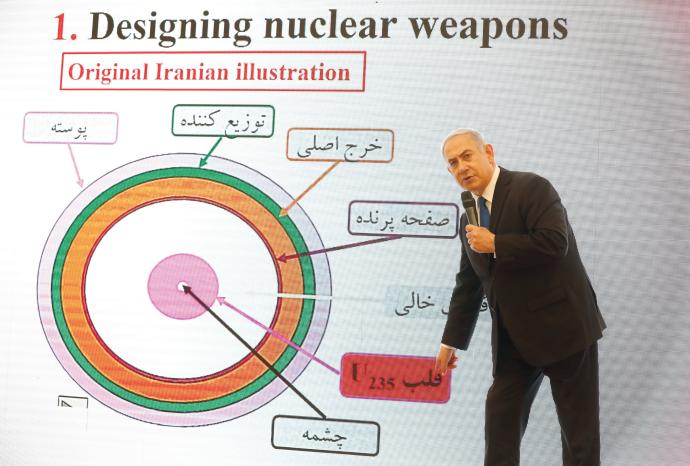Former prime minister Benjamin Netanyahu’s push for the Americans to withdraw from the 2015 Iran deal was detrimental to the fight against the Islamic Republic’s nuclear program, Defense Minister Benny Gantz said at The Jerusalem Post Leaders’ Summit in Tel Aviv on Monday.
“Netanyahu’s push to withdraw from the nuclear deal hurt the fight against the Iranian nuclear program. He did it without proper preparation with the security establishment,” Gantz said.
"Netanyahu's push to withdraw from the nuclear deal hurt the fight against the Iranian nuclear program - he did it without proper preparation with the security establishment."
Defense Minister Benny Gantz
The 2018 withdrawal from the agreement by then-US president Donald Trump was encouraged and praised by Netanyahu, who in 2015 delivered a confrontational speech to Congress regarding the deal.
“The first turning point was Netanyahu’s decision to address Congress in 2015 despite president Obama’s opposition. This decision caused an unprecedented fault line in relations between Israel and the United States,” Gantz said, adding that the second turning point was in 2018, when the US decided to withdraw from the nuclear agreement at Netanyahu’s urging.
According to the defense minister, Netanyahu did not give any instructions – political, economic or regarding military preparations.

“He did not hold regular discussions with the heads of the defense establishment, he did not insist on the preparation of a real “Plan B” in Israel or the US, and he pushed for it at the height of the MABAM [war-between-the-wars] campaign,” Gantz said, adding that “the thought that Iran would surrender did not materialize.”
Though there has been little movement toward a new deal between the West and Iran, with US State Department spokesman Ned Price saying that the deal “is not our focus right now,” on Saturday Iran’s foreign minister Hossein Amirabdollahian claimed on Saturday that the US “is in a rush” to get a nuclear deal with Tehran.
Gantz warned that such a deal “will be short-lived and without the necessary oversight components that correspond with Iran’s progress in the nuclear program.”
Speaking at a Washington Institute Policy Forum in April, Gantz said that Iran was continuing its uranium enrichment and is close to 90% enrichment, which is suitable for nuclear weapons once they decide to reach it.
Netanyahu did not hold discussions with heads of the defense establishment
“To be able to face the complex challenge before us, we must go back and learn from past lessons,” Gantz said, adding that the policies of the Netanyahu-led government “brought us to this situation” and hurt the fight against Iran’s nuclear program.
The defense minister said that when he entered office, he “decided to put preparedness and operations against Iran as a top priority. Here, too, we encountered difficulties in the face of the lack of a state budget, which was taken hostage by Netanyahu’s political whims.”
Nevertheless, “from the moment I took office, we strengthened and renewed operational capabilities and the necessary training, and we have worked toward the significant procurement that had been delayed for years.
“At the same time, with the signing of the Abraham Accords and Israel’s transition to CENTCOM, we began a series of collaborations that strengthen our ability to deal with Iranian aggression in the region and deepen coordination with the US,” he said.
With the elections a week away, Gantz stressed that a “broad and stable government” is needed in order to “deal with challenges responsibly.”
